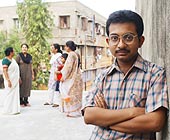 |
| DOING THEM PROUD: Tirthankar Guha Thakurta with family. Photo: Subhendu Chaki |
Piku’s mother doesn’t know that Piku is gay. On rainy mornings she rustles up his favourite lunch of yellow rice and fried hilsa. And as he leaves for college, she stands in the doorway and waves to his back until he becomes a speck on the horizon. And when he comes back home each evening, although she senses a distance through the silence at the dinner table, she doesn’t know that he feels like a caged bird dying to break free and tell the world, especially her, that he is a homosexual. She doesn’t know that day after day her only son sits alone in a corner table at the college canteen, ostracised by his peers. She doesn’t know that night after night he buries his head in his pillow and sobs, shedding a hundred hopeless tears, until finally the oblivion of sleep brings him a few hours of respite.
And she definitely doesn’t know that on one such night when he had gone on a college camping trip with his closest buddies, to whom he had made the mistake of ‘confessing’ his homosexuality, they barged into his room and sexually assaulted him “just to teach him a lesson”.
Piku is the protagonist of Piku Bhalo Aachhey, a short, 48-minute, Bengali film, directed by Tirthankar Guha Thakurta, a student of Calcutta National Medical College. The film, produced by Saathi, an AIDS-awareness group, was completed early last month, and after winning accolades in a short film festival in Bangalore, was shown at Max Muller Bhavan in Calcutta last week. Though fictional, the character of Piku, is based on Guha Thakurta himself. And while he admits that some of what happens to Piku on screen — such as the assault by friends — is actually only a recurrent nightmare in real life, most of it is, he says, “drawn from personal experience”.
Guha Thakurta delineates through Piku’s struggle his own dilemma about whether or not to discuss his sexual orientation with members of his family. In fact, Guha Thakurta himself acts in the film as Piku, with his mother, Bina, playing the part of Piku’s mother.
An only child, whose father died a few years ago and whose mother is a homemaker who dotes on him, Guha Thakurta lives in a large, boisterous and according to him “happy” joint family with uncles, aunts and many cousins.
When he discovered that he was attracted to other boys, he longed to share it with someone whom he could trust. But he insists that the film transcends the personal and tries to capture in general “the agony of many gay men and women who find it distressing that those whom they trust most — members of their families — should not understand them”.
“When a young boy or girl discovers that he or she is homosexual, they are not provided with any reference point, model or example that they can follow,” he explains. “They are made to feel that they are somehow abnormal. At this stage they desperately look for support from the family. But it is also the toughest to talk to them because they have expectations from you and you feel you will let them down. You almost anticipate their reactions and this prevents you from approaching them even if you long to.”
As part of a story-telling sequence in the film, Guha Thakurta gets other men and women from the gay community to relate real-life tales of different family reactions to a girl’s or boy’s ‘coming out’. A member of Sappho for Equality, a Calcutta-based lesbian rights movement, for instance, describes how the parents of a lesbian girl took the extreme measure of first starving her and then forcing her to get married to exorcise the ghost of lesbianism.
“What prevents people from taking family members into confidence,” says Guha Thakurta, “is that they will immediately try and find a ‘cure’ for you as if homosexuality was some sort of disease.”
But he is not blaming them. “It has more to do with them wanting to protect you than anything else,” he says, attempting to analyse the reasons why families are averse to accepting homosexuality in other members. He points out that article 377 of the Indian Penal Code defines “unnatural sex” as a punishable offence. “Such laws obviously make families jittery.”
“You worry about what people will say,” agrees his mother, who, like Piku’s mother, is not entirely aware of her son’s preferred choice of a partner but guesses that he may be gay. “There is nothing wrong with it, of course,” she adds. But that she doesn’t also always see eye to eye with her son on the topic is amply clear. “I still think men and women should get married as per convention,” she says. “Who doesn’t want to be blessed with a daughter-in-law and hear the laughter of grandchildren in the house?” she asks. “And ruin two lives?” Tirthankar cuts in. “This is the problem,” he murmurs, “families want the best for you but never ask you what you want”.
“To us it doesn’t matter what his sexual preference is,” says his aunt Maya. “He is a brilliant student and he has always made us proud. Society needs to accept that there is homosexuality in the world and this acceptance needs to start at home”.
Of course, one of Guha Thakurta’s most effective ways of ‘coming out’ has been making his film. And having done that, he is not so worried anymore whether his family knows or doesn’t know. “After all, when heterosexual boys or girls don’t feel the need for such ‘revelations’why should a gay person?”










